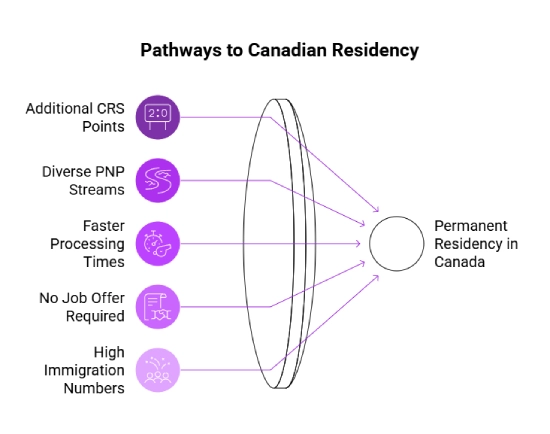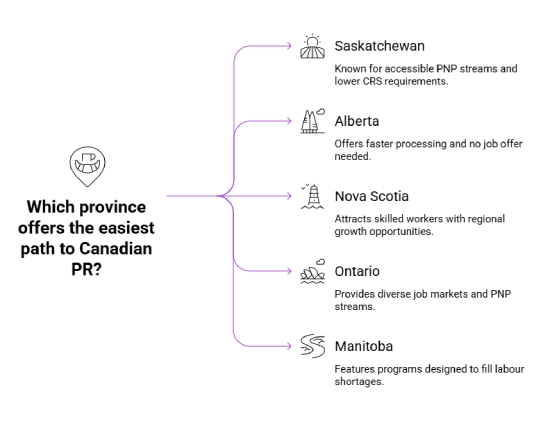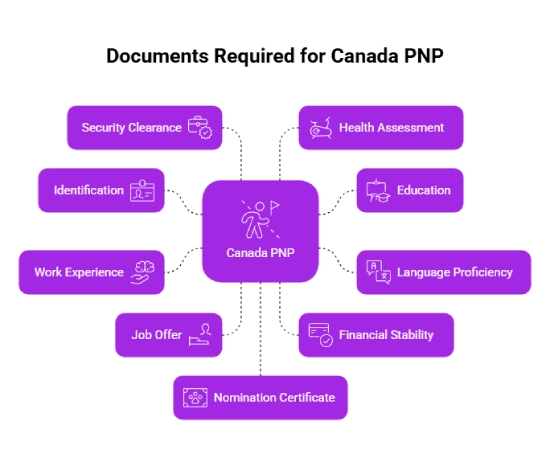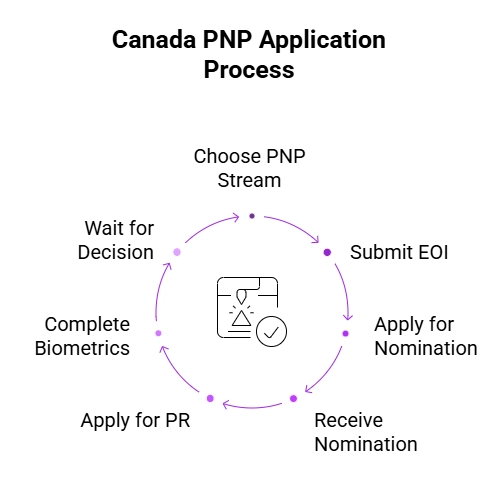Canada's Provincial Nominee Program (PNP) offers a streamlined pathway for skilled professionals, entrepreneurs, and international graduates to obtain permanent residency. Each province creates its own PNP, which meets specific workforce demands to help applicants succeed in their PR applications.

The Provincial Nominee Program (PNP) is a partnership between the federal government and provinces/territories, allowing provinces to nominate skilled workers, students, or business people who meet their local labour market needs. Nominees receive additional points in Express Entry or are invited to apply directly for permanent residency.
Each province in Canada has its own immigration program designed to attract people who can help fill local job needs and support community growth.
Given below is the list of top Canada PNP programs:
*Want to apply for Canada PNP? Let Y-Axis assist you with the process.
Some provinces offer more accessible PNP streams with lower CRS score requirements, faster processing, or no job offer needed. These programs are designed to attract skilled workers who can contribute to regional growth and fill labour shortages. If you're aiming for a smoother path to Canadian PR, these provinces are great starting points.
Top Provinces for Easier PR:

Provinces can nominate applicants through Express Entry–aligned streams.
Step 1: Create your Express Entry profile.
Step 2: A province issues a nomination, adding 600 CRS points.
Step 3: You receive an Invitation to Apply (ITA) in a PNP-specific draw.
Step 4: Submit your PR application to IRCC.
Note: This pathway significantly improves your chances of selection.
The eligibility criteria for Canada PNP varies based on the province, however, here is a general criteria that needs to be fulfilled by Canada PNP applicants:
The documents required for the Canada PNP are as follows:

You can follow the steps below to apply for the Canada PNP:
Step 1: Choose a Provincial Nominee Program (PNP) stream that matches your skills, experience, and goals.
Step 2: Submit an Expression of Interest (EOI), if required by the province.
Step 3: Apply to the province or territory directly for a nomination under the selected PNP stream.
Step 4: If approved, receive a provincial nomination certificate.
Step 5: Apply for permanent residency through IRCC using your nomination.
Step 6: Complete biometrics and any required medical examinations.
Step 7: Wait for a decision on your PR application from IRCC.

A PNP nomination adds 600 points to your Comprehensive Ranking System (CRS) score, practically guaranteeing an ITA regardless of your base score. For example, candidates with base CRS in the 300s become highly eligible with a nomination.
The table below has a complete overview of the major differences between Canada PNP and Express Entry:
| Factor | Provincial Nominee Program (PNP) | Express Entry |
| Pathway Type | Provincial nomination program | Federal immigration system |
| Managed By | Individual provinces and territories | IRCC (Immigration, Refugees and Citizenship Canada) |
| CRS Points Boost | Adds 600 CRS points if aligned with Express Entry | No additional boost unless nominated by a province |
| Job Offer Requirement | Not always required (depends on stream) | Optional, but increases CRS score |
| Application Process | Two-step: Apply to province and then to IRCC | Single-step: Apply directly through federal system |
| Eligibility Criteria | Varies by province and stream | Standard federal eligibility requirements |
| Processing Time | 2–8 months for nomination + 6–19 months for PR (average) | 6–8 months for complete PR processing |
| Occupation Targeting | Based on regional labour shortages | Based on national occupation demand |
| Settlement Obligation | Must intend to live in the nominating province | Can live and work anywhere in Canada |
| Number of Streams | 80+ across all provinces | 3 main programs: FSWP, FSTP, and CEC |
Yes, several provinces in Canada offer PNP streams that do not require a job offer. These programs focus on attracting skilled workers who meet local labour needs through education, work experience, and language proficiency.
You can apply to the following provinces even without a job offer:
The table below has a complete overview of the average processing fee for each of the Canada PNP programs:
| PNP program | Processing Fees (in CAD) |
| Alberta Advantage Immigration Program (AAIP) | $500 - $3,500 |
| British Columbia Provincial Nominee Program (BCPNP) | $1,150 - $3,500 |
| Manitoba Provincial Nominee Program (MPNP) | $500 - $2,500 |
| New Brunswick Provincial Nominee Program (NB PNP) | $250 - $2,000 |
| Newfoundland and Labrador Provincial Nominee Program (NL PNP) | $250 - $1,000 |
| Nova Scotia Nominee Program (NSNP) | NA |
| Ontario Immigrant Nominee Program (OINP) | $1,500 - $3,500 |
| Prince Edward Island Provincial Nominee Program (PEI PNP) | $300 - $10,000 |
| Saskatchewan Immigrant Nominee Program (SINP) | $350 - $2,500 |
| Northwest Territories Nominee Program (NT PNP) | $550 |
| Yukon Provincial Nominee Program (YPNP) | $1,325 |
The table below has a complete overview of the average processing time for each of the Canada PNP programs:
| Province | Average processing Time |
| Alberta Advantage Immigration Program (AAIP) | 3-4 months |
| British Columbia Provincial Nominee Program (BCPNP) | 3-4 months |
| Manitoba Provincial Nominee Program (MPNP) | 4-5 months |
| New Brunswick Provincial Nominee Program (NB PNP) | 6-8 weeks |
| Newfoundland and Labrador Provincial Nominee Program (NL PNP) | 6-8 months |
| Nova Scotia Nominee Program (NSNP) | 8-10 months |
| Ontario Immigrant Nominee Program (OINP) | 3-4 months |
| Prince Edward Island Provincial Nominee Program (PEI PNP) | 6-8 months |
| Saskatchewan Immigrant Nominee Program (SINP) | 5-6 months |
| Northwest Territories Nominee Program (NT PNP) | 16-18 months |
| Yukon Provincial Nominee Program (YPNP) | 8-10 weeks |
| Month | Provinces | No. of Draws | Total No. of Invitations |
|---|---|---|---|
| December | Ontario | 6 | 2,049 |
| British Columbia | 2 | 432 | |
| PEI | 1 | 166 | |
| Manitoba | 1 | 184 | |
| November | Newfoundland and Labrador | 1 | 330 |
| Alberta | 2 | 1125 | |
| British Columbia | 1 | 24 | |
| PEI | 1 | 190 | |
| Manitoba | 2 | 82 | |
| October | PEI | 1 | 160 |
| Newfoundland and Labrador | 2 | 225 | |
| Ontario | 3 | 1680 | |
| Manitoba | 2 | 891 | |
| Alberta | 12 | 2635 | |
| New Brunswick | 2 | 522 | |
| British Columbia | 1 | 485 | |
| September | Manitoba | 2 | 4258 |
| Alberta | 10 | 2819 | |
| PEI | 1 | 129 | |
| Newfoundland and Labrador | 2 | 570 | |
| Ontario | 5 | 4536 | |
| August | Manitoba | 2 | 114 |
| Alberta | 4 | 693 | |
| British Columbia | 1 | 16 | |
| Ontario | 3 | 468 | |
| PEI | 1 | 132 | |
| New Brunswick | 4 | 1052 | |
| Newfoundland and Labrador | 2 | 433 | |
| July | Manitoba | 1 | 67 |
| Alberta | 8 | 433 | |
| Newfoundland and Labrador | 2 | 509 | |
| British Columbia | 1 | 17 | |
| June | Alberta | 8 | 291 |
| PEI | 1 | 52 | |
| Manitoba | 2 | 528 | |
| New Brunswick | 4 | 608 | |
| Ontario | 6 | 3791 | |
| May | Newfoundland and Labrador | 2 | 733 |
| Alberta | 6 | 414 | |
| British Columbia | 2 | 108 | |
| PEI | 1 | 168 | |
| Manitoba | 3 | 118 | |
| April | Newfoundland and Labrador | 1 | 256 |
| Alberta | 7 | 246 | |
| New Brunswick | 2 | 477 | |
| British Columbia | 1 | 5 | |
| PEI | 1 | 168 | |
| Manitoba | 2 | 31 | |
| March | Alberta | 2 | 17 |
| PEI | 1 | 124 | |
| British Columbia | 1 | 13 | |
| New Brunswick | 1 | 498 | |
| Manitoba | 2 | 219 | |
| February | Alberta | 10 | 551 |
| PEI | 1 | 87 | |
| Manitoba | 2 | 117 | |
| Ontario | 1 | 4 | |
| January | Ontario | 1 | 4 |
| British Columbia | 1 | 10 | |
| PEI | 1 | 22 | |
| Manitoba | 2 | 325 |
Y-Axis is the world's No.1 overseas Immigration consultant, providing unbiased and innovative immigration assistance for 25+ years. Our team of experts will assist you with:
Explore what Global Citizens have to say about Y-Axis in shaping their future
Canada PR Visa
Sameer got Permanent Resident Visa for C
Read More...
Canada Work Permit Visa
Varun provided us with great Y-Axis Revi
Read More...
Canada PR Visa
One of our client Virendra availing his
Read More...
The easiest PNP options for immigration in Canada include Saskatchewan together with Alberta Nova Scotia and Prince Edward Island. The provinces which provide nomination streams with lower CRS score requirements do not need candidates to have job offers. Saskatchewan’s Occupation In-Demand stream and Alberta’s Express Entry stream receive recognition as candidate-friendly options.
The PNP allows provinces and territories to nominate immigrants who have the skills and experience needed in their region. You apply to a provincial stream, and if nominated, you apply for permanent residency through IRCC. Some streams are aligned with Express Entry, giving you an extra 600 CRS points.
Yes, some of the Canada Provincial Nominee Programs accept candidates through various streams which do not need job offers. The list of provinces that you can apply for without a job offer is as follows:
You must fulfil the general requirements given below to apply for Canada PNP:
Note: Each province may have additional or stream-specific requirements.
Anyone who meets a province’s specific immigration criteria can apply for Canada’s Provincial Nominee Program (PNP). This includes skilled workers, international graduates, entrepreneurs, and semi-skilled workers depending on the stream.
Applicants must typically have:
To calculate your Provincial Nominee Program (PNP) points, the method depends on whether you're applying through an Express Entry-aligned PNP stream or a base PNP stream.
Express Entry PNP Streams:
These streams are linked to the federal Express Entry system. Your points are calculated using the Comprehensive Ranking System (CRS), which scores you out of 1,200 points based on age, education, language proficiency (IELTS/CELPIP/TEF), work experience, adaptability, and job offers. A provincial nomination adds 600 CRS points, significantly boosting your chances of receiving an Invitation to Apply (ITA) for permanent residency.
Base PNP Streams:
These are managed independently by provinces and have their own scoring systems. For example:
To calculate your score, visit the official website of the province you are applying to and use their specific point calculator or refer to the published assessment criteria.
Note: Scoring criteria and point thresholds vary by stream and province. Regularly monitor the official provincial portals for updates.
Yes, each province publishes its own in-demand occupation list. These lists commonly include:
Note: Priority is given to applicants with experience in these sectors.
Yes, most PNP streams require proof of funds to show you can support yourself and your dependents after moving to Canada. The amount required varies based on your family size and stream type. Express Entry-aligned streams follow the IRCC’s official settlement fund table, while some base PNP streams set their own minimums. Exceptions exist if you’re already working in Canada or have a valid job offer. Official financial documentation such as bank statements or savings certificates are typically required.
Canada PNP fees differ by province and stream. Here’s a quick breakdown (as of 2025):
| PNP program | Processing Fees (in CAD) |
| Alberta Advantage Immigration Program (AAIP) | $500 - $3,500 |
| British Columbia Provincial Nominee Program (BCPNP) | $1,150 - $3,500 |
| Manitoba Provincial Nominee Program (MPNP) | $500 - $2,500 |
| New Brunswick Provincial Nominee Program (NB PNP) | $250 - $2,000 |
| Newfoundland and Labrador Provincial Nominee Program (NL PNP) | $250 - $1,000 |
| Nova Scotia Nominee Program (NSNP) | NA |
| Ontario Immigrant Nominee Program (OINP) | $1,500 - $3,500 |
| Prince Edward Island Provincial Nominee Program (PEI PNP) | $300 - $10,000 |
| Saskatchewan Immigrant Nominee Program (SINP) | $350 - $2,500 |
| Northwest Territories Nominee Program (NT PNP) | $550 |
| Yukon Provincial Nominee Program (YPNP) | $1,325 |
Note: These fees are in addition to federal immigration fees, language tests, ECA (Educational Credential Assessment), and medical exams.